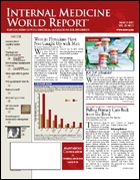Low-Dose Aspirin Every Other Day Reduces Adult-Onset Asthma
Am J Respir Crit Care Med
A new analysis of data from the Physicians’ Health Study (PHS), which included 22,071 healthy male physicians, suggests that using low-dose aspirin every other day can reduce the risk of adult-onset asthma (. 2007; 175: 120-125).
IMWR
The PHS “was not designed to answer the question about whether aspirin prevents asthma,” coinvestigator Tobias Kurth, MD, ScD, of Harvard Medical School and Brigham and Women’s Hospital, Boston, told . “But when we looked at the data from this perspective, we found a significant correlation between aspirin use and reduced onset of asthma among subjects in the trial. Why this is so, we don’t yet know. Our findings suggest a mode of action in aspirin in relationship to asthma that needs to be studied further.”
Dr Kurth emphasized that although these findings suggest that aspirin reduces the risk of asthma in adults, they do not imply that aspirin can improve symptoms in patients who already have asthma. “Aspirin can cause serious bronchospasm in certain asthma patients, so our findings should be read carefully and cautiously.”
This analysis was prompted by an earlier large observational study of analgesic use and adult-onset asthma among women, which showed that women who used aspirin had a lower rate of newly diagnosed asthma than those who never took aspirin.
The PHS was a large-scale, double-blind, randomized, placebo-controlled study that investigated the effects of long-term low-dose aspirin use.
Some 22,071 apparently healthy men (aged 40-84 years) were randomized to aspirin (325 mg every other day) or to placebo. Average follow-up for the aspirin group was 4.9 years. The study was terminated early (in January 1988) because of the extreme benefits (44% reduction) shown in preventing a first myocardial infarction in the aspirin group.
Among the 22,040 patients without asthma at randomization, 113 patients were newly diagnosed with asthma in the aspirin group and 145 in the placebo group—a significant 22% risk reduction in the former.
The results were not affected by smoking status, body mass index, or age.
“The observation that alternate-day use of aspirin reduced the rate of new-onset asthma in 22,000 men over 40…is interesting,” Homer Boushey, MD, chief of the Asthma Clinical Research Center and Division of Allergy and Immunology at the University of California, San Francisco, told IMWR. “The roughly 22% reduction in risk translates, in absolute terms, to prevention of very few cases.?However, the significance of the study is that it raises questions about the possible importance of classical inflammation in the pathogenesis of asthma.”
